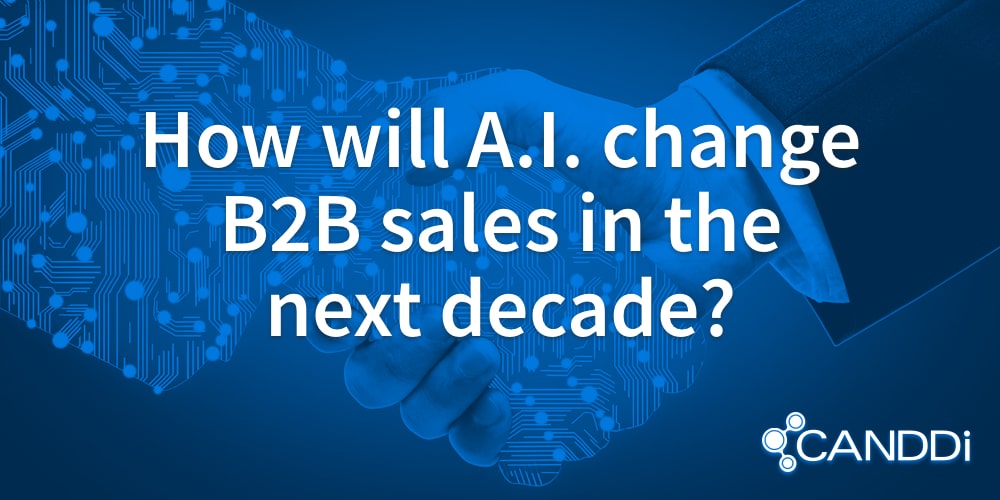Blog and News > sales > How will A.I. change B2B sales in the next decade?
How will A.I. change B2B sales in the next decade?
It isn’t easy to predict how technology will change business. Change can be erratic, and unfortunately Nostradamus passed away before he could jot down his thoughts on B2B lead generation.
Sales is governed by human interaction. 92% of all sales conversations actually happen over the phone, and it’s a safe bet that we’ll never see this human element completely removed from sales — and certainly not in the next decade.
That said, A.I. technology has already seen sales progress from an art to a science over recent years. As it becomes a much more data driven endeavour, sales becomes less about cold calling prospects armed with nothing but a silver tongue, and more about using multiple A.I. processes to have informed interactions with hot leads.

A.I. in lead generation
A great use of artificial intelligence is to automate the initial stage of prospect outreach, with the aim of qualifying the lead and passing it over to a salesperson.
To see this process already in action today, look no further than chatbots. Chatbots can already be preprogrammed with a large number of responses to a number of questions, and also to ask some themselves.
As the technology progresses, however, the usefulness of chatbots in lead generation will skyrocket. Prospects will be able to have truly dynamic and intelligent interactions with chatbots, and the bots themselves will begin to learn and improve, refining the experience even further.
The result will be an automatic process which takes away the time-consuming job of qualifying leads from salespeople. Better still, automated processes are scalable with minimal resources, meaning chatbots can generate many more quality leads than a single salesperson could hope to manually.
A.I. in lead handling
Knowing which leads to pursue – and how to pursue them – can be difficult. Most marketing automation software can already help salespeople make informed decisions about how to move forward with leads, but advanced A.I. over the next decade will take this to the next level.
One way we’ll see this progress is in lead scoring and prioritization. These functions already exist in most marketing automation software – leads are scored based on their level of interest and potential value – but this will no doubt become more granular and effective.
Imagine being able to tell at a glance which leads you should chase first, based on the recommendation of an A.I. that has analyzed vast amounts of historical and behavioural data. Every action a prospect has taken will be considered, along with their personal characteristics, business sector, and any other piece of microdata that can possibly be acquired.
A.I. won’t just be able to advise on who, but also how. Wondering which deal or discount would be the optimal offer for a particular type of prospect, or how soon you should contact someone without risk of them being annoyed or losing interest? A.I. will evaluate these decisions in the blink of an eye, and take into account a quantity of data that a human couldn’t hope to process themselves.
A.I. in closing sales
Closing a sale is where A.I. will have the biggest problem competing with that human touch. Customers tend to want the reassuring contact of a human voice before they commit to a significant purchase.
A.I. will likely play a much larger role in selling to existing customers, however. Once a relationship has been established by a human salesperson, attempts to upsell and gain repeat is something an intelligent A.I. could achieve with minimal further input from that salesperson.
Automatic processes could be set in place to carry out deep analysis of a customer’s buying behaviour, as well as historical data of similar customers before them. Carefully tailored material could then be drip fed in an effort to drive further sales, perhaps without the customer even knowing there isn’t a human on the other side.
Conclusion
It’d be easy, as a salesperson, to witness the growing capabilities of A.I. and fear for your job. The fear is unfortunately a legitimate one for plenty of careers, with McKinsey recently forecasting that 800 million jobs worldwide will be replaced by robots over the next 12 years.
Thankfully, the necessary human aspect of selling makes it very likely that salespeople will be safe. Thus, as intelligent automation becomes more widely used in the world of B2B sales, it would be wise to adapt and recognise A.I. for what it is: not a tool to steal your job, but one to make you better at it.